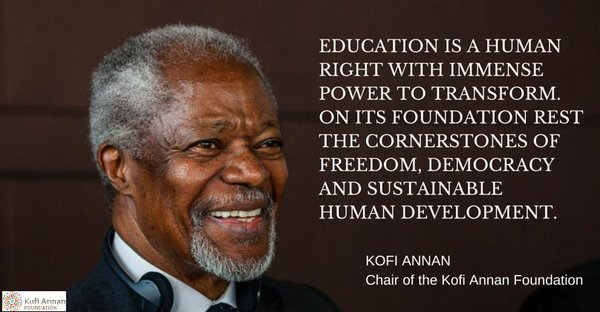
Written by: Shannon Maroutian
Unsurprisingly, education plays a key role in the eradication of poverty. However, those living in poverty may quit to work in order to support themselves and their family, leaving them without basic skills for the future. The vicious cycle is continued when their children find themselves in a similar situation: quit school, find an income. Therefore, it is vital that governments in developing countries help families escape the cycle of poverty through social programs that aim to develop an educated society.
Improving access to education is one of the most undeniable ways of ending the cycle of poverty. Both the Universal Declaration of Human Rights and the United Nations Convention on the Rights of the Child declare education as an essential human right. The right to education promises that every child has access to quality learning. In turn, increased rates of education will produce better employment opportunities, improve overall health, and increase economic growth. The benefits of an educated society extend across class-boundaries since more people acquire the skills needed to generate productivity gains for the state.
According to the United Nation’s Education for All Global Monitoring Report, providing all children with quality primary education would boost economic growth by 2% in low-income countries. About 170 million people could be lifted out of poverty if all students in poor countries had basic reading skills. While these statistics show that an increase in education rates in developing countries would improve overall economic growth, at least 250 million children are still unable to read, write, or count.
The effects of increasing quality education in developing countries cannot be understated. Education improves food security and reduces malnutrition by teaching youth about agriculture and proper nutrition. Education improves the overall standard of health by educating men and women on healthy pregnancy, children’s health, clean water and sanitation. Education reduces the threat of disease and viruses by spreading information on prevention and rehabilitation. Finally, education also reduces gender inequality by teaching children on the effects of young marriages and pregnancies.
Expanding access to education is essential for development in many of the poorer African states. According to the Africa Learning Barometer, only half of sub-Saharan Africa’s 128 million youth in school are likely to learn basic skills to live healthy and productive lives. Gender, income, and region contribute to the learning gaps in countries like Zimbabwe, South Africa, Uganda, Lesotho, Malawi, and Botswana. For different reasons, rural areas in Africa are the most disadvantaged in terms of schooling. Rural schools suffer from a lack of willing teachers because urban schools generally offer better opportunities with higher incomes. Urban schools have access to better infrastructure, health services, and general goods. Meanwhile, rural teachers are often less qualified and overwhelmed by the pupil to teacher ratio. Many African governments face an education crisis that needs to be addressed by implementing policies that improve infrastructure, health and sanitation needs. Rural development through social programs is necessary if African governments wish to see an improvement in the overall quality of education in their state.
In 2012, the United Nations Secretary-General Ban Ki-Moon launched the Global Education First Initiative, which seeks to ensure every child receives a quality education. Ban Ki-Moon stated: “Our shared goals are simple. We want children to attend primary school and to progress toward higher education that will help them to succeed in life. We cannot stop until every child goes to school. This is our task, this is our homework.” The initiative aims to achieve the enrolment of all children of member states in primary education. The initiative’s Top Ten supporters and advocates include: Australia, Bangladesh, Benin, Brazil, China, Croatia, Denmark, Guyana, South Africa, and Tunisia.
While the role of education is largely promoted on the international scale by non-governmental organizations (NGO) like United Nations and Child Fund, it is important that state governments, especially in underdeveloped countries, do so as well. With the financial, moral and educational help of developed nations and NGO’s, the eradication of poverty through education can be achieved in many underdeveloped states.

